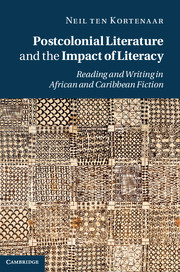 Postcolonial Literature and the Impact of Literacy
Postcolonial Literature and the Impact of Literacy Book contents
- Frontmatter
- Contents
- Acknowledgements
- 1 Introduction
- 2 The coming of literacy: Arrow of God by Chinua Achebe
- 3 The contents of the tin trunk: Ìsarà by Wole Soyinka
- 4 Mr Biswas finds a home in the world on paper: V. S. Naipaul
- 5 Literacy in the world not ruled by paper: Myal by Erna Brodber
- 6 Southern Africa's Houses of Hunger
- 7 Conclusion: the frontiers of writing
- Notes
- Bibliography
- Index
6 - Southern Africa's Houses of Hunger
Published online by Cambridge University Press: 01 June 2011
- Frontmatter
- Contents
- Acknowledgements
- 1 Introduction
- 2 The coming of literacy: Arrow of God by Chinua Achebe
- 3 The contents of the tin trunk: Ìsarà by Wole Soyinka
- 4 Mr Biswas finds a home in the world on paper: V. S. Naipaul
- 5 Literacy in the world not ruled by paper: Myal by Erna Brodber
- 6 Southern Africa's Houses of Hunger
- 7 Conclusion: the frontiers of writing
- Notes
- Bibliography
- Index
Summary
Doris Lessing, who grew up in Southern Rhodesia (modern Zimbabwe), recalls how she became a reader and eventually a writer. Although her family lived in a mud hut on a remote farm, she was exposed to books from a young age and had little to do but to read:
The bookshelves at home were full of books not only because my parents took books with them to Africa, but because they continually ordered books from London, every kind of book and periodical. In those days it took a long time. First the letter from the farm in Africa took over a month to get to London. There the order had to be processed. Then the parcels of books took a month or so by ship to Africa. They went from the port by train to old Salisbury, were put on another train, and were fetched from the station by a servant who bicycled or walked the seven miles. I shall never forget my excitement as the books were unwrapped. What had arrived this time? A remarkable mix of books, and I seized Black Beauty, or Little Women, or Pride and Prejudice, or The Mayor of Casterbridge, or the story of Alexander the Great, and bore them off to my room, where books were piled on chairs, on the empty bed beside mine, around the walls – where they were always in danger of being devoured by fishmoths or white ants.
- Type
- Chapter
- Information
- Postcolonial Literature and the Impact of LiteracyReading and Writing in African and Caribbean Fiction, pp. 163 - 186Publisher: Cambridge University PressPrint publication year: 2011


